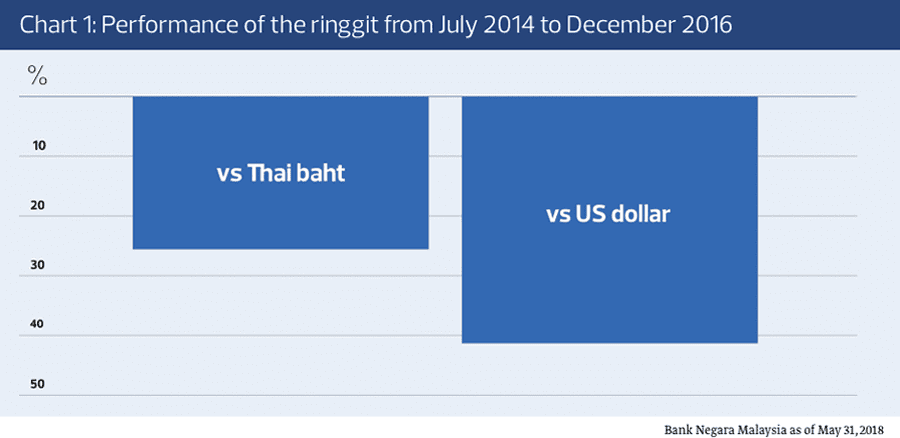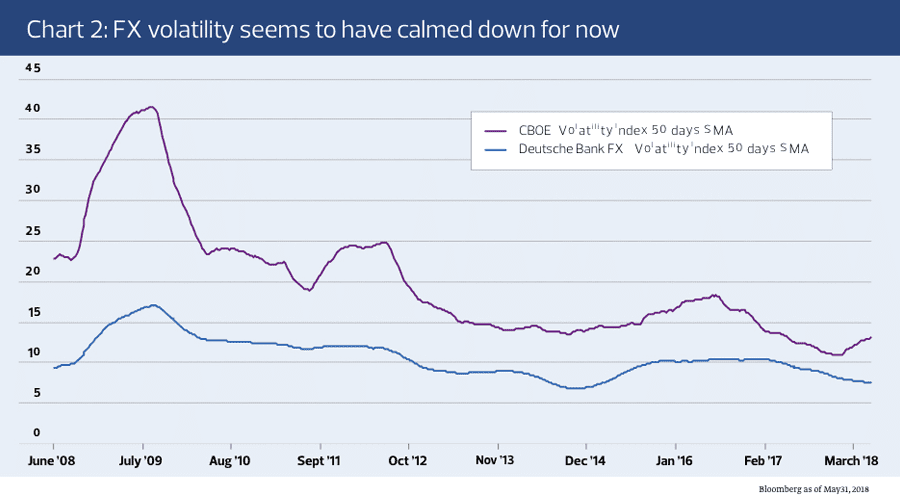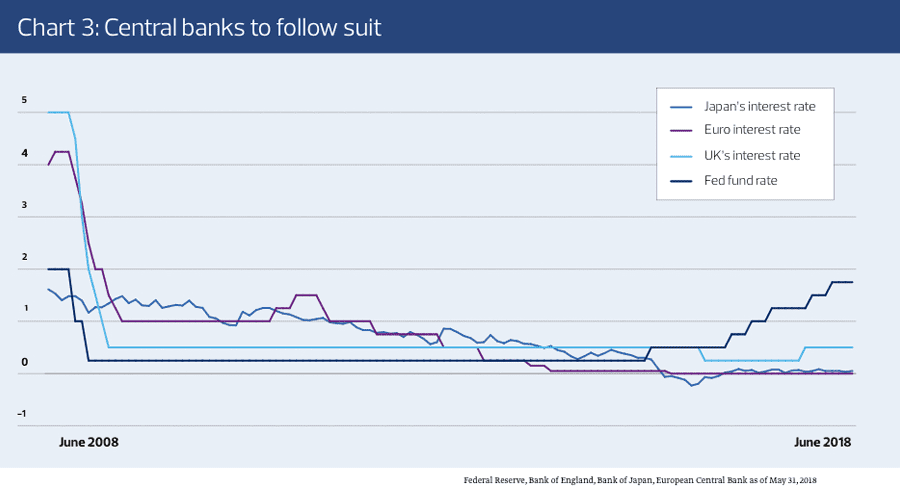Like all investments, too high an exposure in one country or one asset class may subject the portfolio to high concentration risk, especially when the particular country or asset class is in trouble. Similarly, too high an exposure to one currency is also not ideal, especially in the current environment of expected higher currency volatility.
It does not help that most investors across the world demonstrate a home bias, which means that they are investing more in their home countries due to lack of familiarity. Such investors will be exposed to currency risk if their home currencies depreciate significantly as their financial needs are denominated in foreign currencies, as witnessed in the ringgit volatility from July 2014 to December 2016 (see Chart 1).
To mitigate this risk, they should have a well-diversified portfolio consisting of assets denominated in major currencies, says the RHB Wealth Research team. According to the team, diversification in foreign currencies and assets not only serves as a natural hedge but also a cost-free solution to help investors protect their returns on their overall portfolios.
Besides, investors who wish to have an exposure in foreign assets but do not want to be exposed to foreign exchange (FX) risk can consider investing in products that are fully or partially hedged against currency exposure.
A global solution
Currency volatility has calmed down in the first half of 2018, diverging from the rising CBOE Volatility Index, which represents volatility in the equity market (see Chart 2). However, investors should be aware that volatility in the FX space may increase in the coming months as central banks in major countries are likely to change their stance when the economic outlook improves, and this has the tendency to result in volatility in equities.
The US Federal Reserve (Fed) has continued in its rate hike path, which began in 2015, and other major central banks, such as the Bank of England (BoE), Reserve Bank of Australia and European Central Bank (ECB), may follow suit. This may cause countries with budget deficits — especially the emerging markets — to face strong headwinds as it may lead to a rating downgrade and subject the countries’ currencies to higher volatility.
here are many products that investors can look at to diversify their portfolios in major foreign currencies. These include unit trusts, retail bonds and structured products that cater for the investor’s needs. With an array of investment products denominated in major currencies such as the ringgit, US dollar, Australian dollar and Singapore dollar, investors can turn to RHB to achieve a true diversification.
Currency outlook for 2H2018
After six years of upswing, the US dollar has slipped 10% from its peak (December 2016 to January 2018), measured by a US dollar index benchmarked against a basket of major currencies. Despite strong economic news such as full employment, encouraging wage growth and rising inflation, the bull in the greenback may not be back anytime soon and the US dollar is expected to stay range-bound going forward.
On the other hand, the euro — one of the best performing currencies in developed markets last year — is likely to edge higher this year. This is in line with the expectation that the ECB is likely to shift its tone from neutral to hawkish, where the central banker starts assessing signs of stronger inflation in German’s Consumer Price Index, which grew at 2.2% in May on an annualised basis. The euro will also be supported by a solid European Union account surplus and the strong employment market. The recent correction, which sent the euro/US dollar to the 1.15 level, may be attractive and it is expected to end the year higher.
In close proximity to the euro, the British pound is also seeing some upside momentum, having climbed to its highest level in mid-April since Brexit. Market participants are now less worried about the progress of Brexit after the deadline was extended to 2020 and positive outcomes were achieved from the negotiations. The market is now repricing a slightly hawkish BoE, further easing concerns about Brexit. While staying vigilant on Brexit, the RHB Wealth Research team is tactically bullish on the pound sterling in the short to medium term.
The ringgit was one of the best performing currencies in Asia last year, but it slipped against major currencies as investors shied away due to uncertainties after the May 9 general election. The newly elected government is making efforts to enhance the long-term financial stability of the country at the expense of a few mega projects and rationalise its expenses.
As a result, government expenditure may be reduced and GDP growth may soften in the near term, the same goes with our currency. In the long run, the ringgit will remain resilient at its fair value of 3.70 to 3.90 against the US dollar with stronger oil prices, an improving budget deficit and an inflow of foreign funds. The oil prices have fully reflected on the US’ withdrawal from the Iranian nuclear deal and are poised to rally once the correction is over.
Looking at the smart money flowing into Japanese equities, foreign investors are reducing their hedge in the yen, which means that they are increasing their long yen exposure. The rosy yen outlook is mainly due to it being one of the cheapest currencies currently, from a fundamental equilibrium valuation perspective. The Bank of Japan is also downsizing its quantitative easing, which may present a case for a higher yen going forward, encouraging more investors to increase their exposure to the currency.
While the furious trading of threats between the US and China over trade tariffs has weighed on the equity and credit markets, it has yet to spill over to the FX space. The market is still unsure on the outcome of the trade war as the situation has not improved and there are frequent flip-flopping by the Trump administration. However, both parties are expected to avoid the extreme scenario that will bring negative economic and market impacts. If the negotiations go well, the renminbi is expected to continue in its gradual appreciation path.
To better manage your foreign currency investment portfolio, RHB is offering investment products denominated in local and foreign currencies, allowing you to lower your currency fluctuation risk while achieving your investment goals.
As the market is, in general, expecting an uptick in inflation this year, investors can also turn to gold as a safe haven hedging tool. The precious metal has always played an important role in the monetary system since ancient times, and is referred to as a currency and a commodity.


